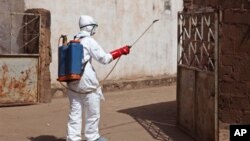Knowing where the Ebola hot spots are in a country is crucial to getting an outbreak quickly under control. Many have criticized the initial slow response to the West Africa outbreak, saying it’s a big reason the virus quickly spread. Now, a German research center is developing a project to monitor Ebola and other outbreaks in real time.
Professor Gérard Krause said the new project – called EBOKON – uses real-time monitoring to better manage an outbreak.
“At the moment we don’t have treatments available and we don’t have vaccines available," he said. "And even if we did we would still need rapid follow-up of every new case that is occurring in order to guide this new patient to proper isolation and treatment.”
Even more important, he said, is finding all those who came in contact with the patient – a process called contract tracing.
“Capture every contact person and to follow-up this contact person for 21 days and to see that they don’t develop fever. If you have a number of cases it can be very, very complex, very rapidly – and will rapidly overwhelm the staff in the field. So for that reason we are trying to build a management tool that will facilitate this task,” he said.
Krause is head of the Department of Epidemiology at the Helmholtz Center for Infection Research – and EBOKON project leader for the German Center for Infection Research.
He said, “This is an information technology tool that we are developing together with colleagues from Nigeria that will take care of all those management aspects.”
The EBOKON project calls for setting up a command center, so to speak, in the capital of affected countries. Then health workers would use cellphones to relay in real time information on suspected cases around the country.
“From the first entry of a rumor entering the public health service, they would send someone to verify the case. And when this case is verified there would be diagnostic initiated. When the diagnostic is confirmed there will be contact persons followed up for 21 days. If they develop fever, they will then again be treated as suspect people. And so it gets very complicated very fast. We need a management tool that takes care of that,” Krause said.
The health workers would be contacted by cellphone with instructions on how to handle their situation.
“The emergency operations center in the center of the city will have a full overview of what’s happening – and can also redirect the resources accordingly. At the moment we are working in Nigeria on this for the simple reason that they have successfully gone through the experience in containing the outbreak and this is very valuable experience. And should it become successful there it will, of course, be applicable generally to any other country,” he said.
The Nigerian EBOKON project is taking place in Lagos and Port Harcourt. Qualified personnel are being borrowed from other groups to help test the system. Some 500 cellphones will be distributed. The German Ministry of Education and Research is providing $3 million to fund the project.
In all, 10 EBOKON projects are on the drawing board for the next 14 months. Besides Ebola, they’ll manage the latest information on vaccine research and analysis of the infection process.





